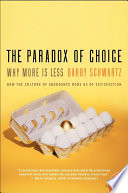

In modern society, we are inundated with choices in virtually every aspect of our lives. From consumer products to lifestyle decisions, the sheer volume of options can be overwhelming. This overabundance can lead to anxiety and paralysis, as individuals struggle to make decisions. Barry Schwartz, the author, argues that while some choice is essential for autonomy and satisfaction, too much choice can lead to negative outcomes such as regret and dissatisfaction. The paradox lies in the fact that while we believe more choices will lead to greater happiness, it often results in the opposite. Schwartz illustrates this with examples from various domains, including shopping, career paths, and even relationships. The key takeaway is that a limited set of choices can enhance satisfaction and ease the decision-making process.
Continue readingSchwartz introduces two types of decision-makers: maximizers and satisficers. Maximizers strive to make the best possible choice by exhaustively searching for the optimal option. They often feel pressure to evaluate every possible alternative, leading to stress and potential dissatisfaction. On the other hand, satisficers settle for a choice that meets their criteria for adequacy, which can lead to quicker decisions and often greater contentment. Schwartz suggests that satisficing is a healthier approach in a world filled with choices, as it allows individuals to enjoy their decisions rather than obsess over potential missed opportunities. He provides research findings showing that satisficers tend to be happier and more fulfilled than maximizers, who frequently experience regret and second-guessing.
Continue readingWith every choice we make, we inevitably forgo other options—this is known as the opportunity cost. Schwartz emphasizes that the awareness of these costs can lead to anxiety and regret. When individuals are faced with numerous options, they often dwell on what they could have chosen instead, leading to dissatisfaction with their final decision. This phenomenon is particularly evident in consumer behavior, where buyers may experience buyer's remorse after making a purchase, fixating on alternative products they did not select. Schwartz argues that recognizing and accepting opportunity costs can help mitigate feelings of regret and enhance overall satisfaction with decisions made.
Continue readingExpectations play a critical role in how we perceive the outcomes of our choices. Schwartz discusses how higher expectations can lead to disappointment, especially when the reality does not meet them. In a world with many choices, individuals often set unrealistic expectations for their decisions. When they inevitably fall short, it can lead to dissatisfaction and regret. Schwartz advises that managing expectations is crucial; by aligning them with reality, individuals can enhance their satisfaction with their choices. This concept is particularly relevant in consumer behavior, where marketing often inflates expectations, leading to a disconnect between anticipated and actual satisfaction.
Continue readingRegret is a powerful emotion that can significantly influence our decision-making processes. Schwartz explores how the fear of regret can paralyze individuals, preventing them from making choices altogether. This fear is exacerbated in environments with many options, where the potential for regret increases. Schwartz suggests that learning to cope with regret—by reframing it as a part of the decision-making process—can help individuals become more comfortable with their choices. He emphasizes that rather than avoiding regret, individuals should focus on making informed decisions and accepting the outcomes, thus reducing the emotional burden associated with choice.
Continue readingTo combat the negative effects of excessive choice, Schwartz offers practical strategies for simplifying decision-making. He encourages individuals to limit their options intentionally, focusing on a manageable number of choices that align with their values and needs. This could mean setting criteria for decisions, creating 'decision rules,' or even seeking the advice of others to narrow down options. By reducing the number of choices, individuals can alleviate the stress associated with decision-making and enhance their satisfaction with the outcomes. Schwartz's strategies are aimed at helping readers take control of their choices in a way that promotes happiness and reduces anxiety.
Continue readingSchwartz discusses the broader cultural implications of choice, particularly in Western societies where individualism and personal freedom are highly valued. He argues that this cultural emphasis on choice has led to a paradox where the abundance of options can actually diminish well-being. Schwartz highlights that in cultures with fewer choices, individuals often report higher levels of satisfaction and happiness. He calls for a reevaluation of how society views choice, suggesting that a more balanced approach that values quality over quantity may lead to greater fulfillment. This idea encourages readers to reflect on the societal norms surrounding choice and consider how they can cultivate a healthier relationship with decision-making.
Continue readingThe reading time for The Paradox of Choice depends on the reader's pace. However, this concise book summary covers the 7 key ideas from The Paradox of Choice, allowing you to quickly understand the main concepts, insights, and practical applications in around 21 min.
The Paradox of Choice is definitely worth reading. The book covers essential topics including The Overabundance of Choices, Maximizers vs. Satisficers, The Cost of Opportunity, providing practical insights and actionable advice. Whether you read the full book or our concise summary, The Paradox of Choice delivers valuable knowledge that can help you improve your understanding and apply these concepts in your personal or professional life.
The Paradox of Choice was written by Barry Schwartz.
If you enjoyed The Paradox of Choice by Barry Schwartz and want to explore similar topics or deepen your understanding, we highly recommend these related book summaries:
These books cover related themes, complementary concepts, and will help you build upon the knowledge gained from The Paradox of Choice. Each of these summaries provides concise insights that can further enhance your understanding and practical application of the ideas presented in The Paradox of Choice.